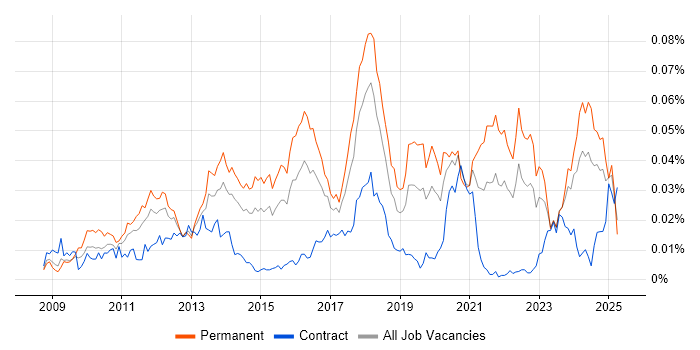NVIDIA CUDA
UK
The table below looks at the prevalence of the term CUDA in permanent job vacancies. Included is a benchmarking guide to the salaries offered in vacancies that cited CUDA over the 6 months leading up to 30 April 2025, comparing them to the same period in the previous two years.
| 6 months to 30 Apr 2025 |
Same period 2024 | Same period 2023 | |
|---|---|---|---|
| Rank | 665 | 824 | 942 |
| Rank change year-on-year | +159 | +118 | +201 |
| Permanent jobs citing CUDA | 19 | 61 | 45 |
| As % of all permanent jobs advertised in the UK | 0.036% | 0.062% | 0.043% |
| As % of the Miscellaneous category | 0.11% | 0.17% | 0.099% |
| Number of salaries quoted | 12 | 50 | 39 |
| 10th Percentile | £42,125 | £39,500 | - |
| 25th Percentile | £50,000 | £42,188 | £34,875 |
| Median annual salary (50th Percentile) | £67,500 | £55,000 | £52,500 |
| Median % change year-on-year | +22.73% | +4.76% | -17.65% |
| 75th Percentile | £77,500 | £73,750 | £76,250 |
| 90th Percentile | - | £88,000 | £76,500 |
| UK excluding London median annual salary | £67,500 | £50,000 | £43,250 |
| % change year-on-year | +35.00% | +15.61% | - |
All Generic Skills
UK
CUDA falls under the General and Transferable Skills category. For comparison with the information above, the following table provides summary statistics for all permanent job vacancies requiring generic IT skills.
| Permanent vacancies with a requirement for generic IT skills | 18,032 | 35,027 | 45,319 |
| As % of all permanent jobs advertised in the UK | 34.57% | 35.62% | 43.58% |
| Number of salaries quoted | 9,839 | 23,030 | 23,975 |
| 10th Percentile | £31,500 | £28,000 | £35,271 |
| 25th Percentile | £42,500 | £38,000 | £46,350 |
| Median annual salary (50th Percentile) | £60,000 | £55,000 | £65,000 |
| Median % change year-on-year | +9.09% | -15.38% | +4.00% |
| 75th Percentile | £80,000 | £75,000 | £86,250 |
| 90th Percentile | £110,000 | £97,500 | £107,500 |
| UK excluding London median annual salary | £55,000 | £50,000 | £55,000 |
| % change year-on-year | +10.00% | -9.09% | +4.76% |
CUDA
Job Vacancy Trend
Job postings citing CUDA as a proportion of all IT jobs advertised.

CUDA
Salary Trend
3-month moving average salary quoted in jobs citing CUDA.
CUDA
Salary Histogram
Salary distribution for jobs citing CUDA over the 6 months to 30 April 2025.
CUDA
Top 11 Job Locations
The table below looks at the demand and provides a guide to the median salaries quoted in IT jobs citing CUDA within the UK over the 6 months to 30 April 2025. The 'Rank Change' column provides an indication of the change in demand within each location based on the same 6 month period last year.
| Location | Rank Change on Same Period Last Year |
Matching Permanent IT Job Ads |
Median Salary Past 6 Months |
Median Salary % Change on Same Period Last Year |
Live Jobs |
|---|---|---|---|---|---|
| UK excluding London | +178 | 19 | £67,500 | +35.00% | 25 |
| England | +141 | 13 | £70,000 | +27.27% | 41 |
| South East | +90 | 6 | £67,500 | +35.00% | 8 |
| South West | +112 | 4 | £70,000 | - | 3 |
| Northern Ireland | - | 4 | - | - | |
| Midlands | +52 | 2 | - | - | 1 |
| West Midlands | +44 | 2 | - | - | |
| Wales | - | 2 | £42,500 | - | |
| Work from Home | +165 | 1 | £65,000 | +18.18% | 21 |
| North West | - | 1 | £60,000 | - | |
| North of England | - | 1 | £60,000 | - |
CUDA
Co-occurring Skills and Capabilities by Category
The follow tables expand on the table above by listing co-occurrences grouped by category. The same employment type, locality and period is covered with up to 20 co-occurrences shown in each of the following categories:
|
|
||||||||||||||||||||||||||||||||||||||||||||||||||||||||||||||||||||||||||||||||||||||||||||||||||||||
|
|
||||||||||||||||||||||||||||||||||||||||||||||||||||||||||||||||||||||||||||||||||||||||||||||||||||||
|
|
||||||||||||||||||||||||||||||||||||||||||||||||||||||||||||||||||||||||||||||||||||||||||||||||||||||
|
|
||||||||||||||||||||||||||||||||||||||||||||||||||||||||||||||||||||||||||||||||||||||||||||||||||||||
|
|
||||||||||||||||||||||||||||||||||||||||||||||||||||||||||||||||||||||||||||||||||||||||||||||||||||||
|
|
||||||||||||||||||||||||||||||||||||||||||||||||||||||||||||||||||||||||||||||||||||||||||||||||||||||
|
|
||||||||||||||||||||||||||||||||||||||||||||||||||||||||||||||||||||||||||||||||||||||||||||||||||||||
